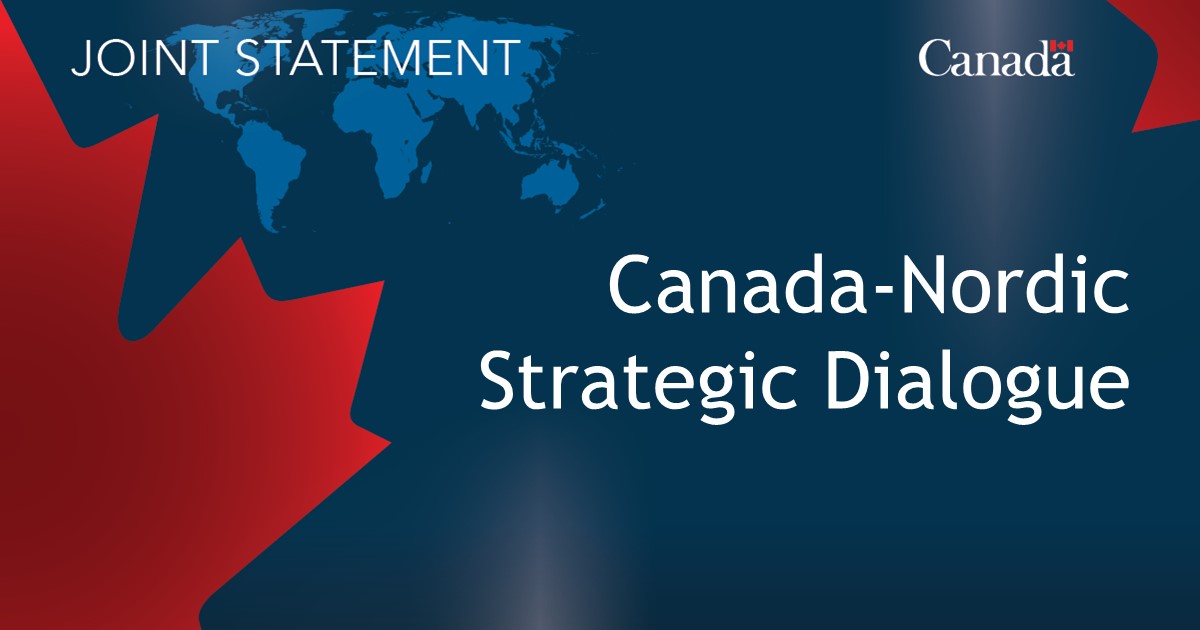


September 29, 2024 – Iqaluit, Nunavut – Global Affairs Canada
Between September 27 and 29, 2024, the foreign ministers of Canada and the Nordic countries met in New York and Iqaluit, Nunavut, for the Canada-Nordic Strategic Dialogue. This meeting delivers on the commitment for foreign ministers to hold a strategic dialogue, made at the Prime Minister level meeting in Iceland, on June 26, 2023. On September 27, 2024, the foreign ministers of Canada, Denmark, Iceland, Norway, and Sweden and the State Secretary to the Minister for Foreign Affairs of Finland met in New York. On September 28 and 29, they traveled to Iqaluit, Nunavut where they were joined by the Foreign Minister of the Faroe Islands and an official from the Government of Greenland (Naalakkersuisut). In Iqaluit, Iceland was represented by the Deputy Permanent Secretary of State / Arctic Ambassador.
Canada and the Nordic countries enjoy a strong and deepening partnership, anchored in our common democratic values, shared interests in the North Atlantic and the Arctic region, as well as our commitment to the rules-based international order, multilateral cooperation, international law, democracy, human rights, and tackling disinformation. The transatlantic relationship is key to our collective security, and we will work together to strengthen this relationship. This is the foundation upon which we commit to work pragmatically together to address complex global challenges, including those arising from challenges to the global order.
In New York, substantive issues were discussed relating to Russia’s illegal and full-scale invasion of Ukraine, transatlantic cooperation, and the concerning developments taking place in the Middle East, including the Gaza Strip. The foreign ministers reiterated their steadfast support to Ukraine in the face of continued Russian aggression and re-affirmed their commitment to continue to provide Ukraine the means to defend itself for as long as it takes. They also condemned the hostile hybrid operations Russia conducts in response to support given to Ukraine.
The Iqaluit portion of the Dialogue focused on Arctic issues. As Arctic nations, Canada and the Nordic countries share a deep commitment to multilateral cooperation and international law, including UNCLOS. Inclusive engagement with those who live there, including Indigenous peoples, is essential to ensure a stable, prosperous and secure Arctic region. The foreign ministers committed to work together to achieve these goals. To this end, they agreed to explore means through which to deepen security dialogue amongst all like-minded states in the Arctic.
In Iqaluit, the delegation heard valuable perspectives from the Government of Nunavut, Inuit leaders including from Inuit Tapiriit Kanatami, National Defence officials and Canadian Rangers on the context, realities and challenges experienced by northerners in the Canadian Arctic. The foreign ministers expressed their strong concern over the intensifying impacts of climate change, notably in the Arctic. They re-affirmed their commitment to work pragmatically together to address complex climate change challenges, to promote sustainable economic growth in the Arctic, to foster regional stability and to support closer collaboration, including North-to-North and Indigenous-to-Indigenous connections.
Canada and the Nordic countries will continue to explore opportunities to deepen collaboration in addressing wildland fires in the North and securing healthy oceans and ecosystem-based resources as part of a comprehensive, knowledge-based, and sustainable approach to ocean management.
The foreign ministers recognize that our countries possess significant deposits of critical minerals and confirm their commitment to promote the responsible development of sustainable and resilient critical mineral value chains and to work together to advance economic well-being, defence and security, infrastructure, energy security and connectivity, including in the Arctic.
The foreign ministers agreed to continue the dialogue on shared policy priorities and to further strengthen the transatlantic cooperation between Canada and the Nordic countries.